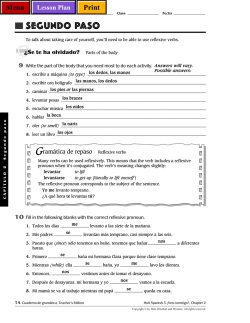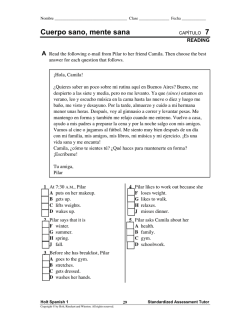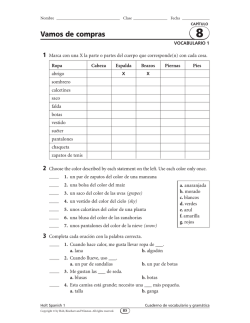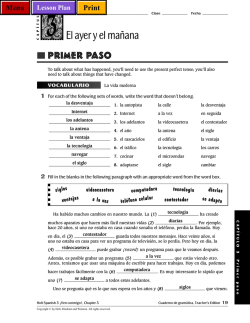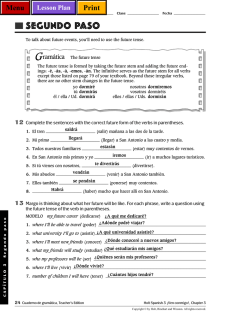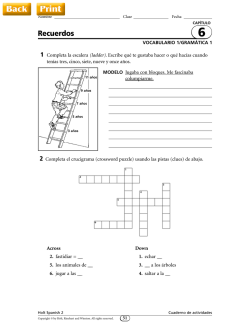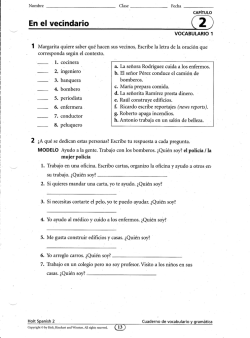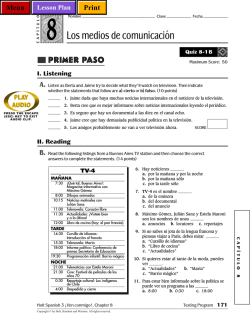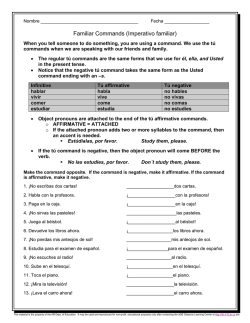
Por una vida sana
C A P Í T U L O Menu Lesson Plan 2 Nombre Print Clase Fecha Por una vida sana PRIMER PASO To ask for and give advice, you’ll need to use informal commands. You’ll also need to be familiar with expressions that people use to talk about their feelings and problems. Gramática de repaso Informal commands The affirmative informal commands are the same as the él/ella form of the verb. Another way to think of forming them is by dropping the -s of the tú form of the verb. Tú estudias. ➔ ¡Estudia! CAPÍTULO 2 Primer paso The negative commands are formed by dropping the -o of the yo form and adding -es if it’s an -ar verb and adding -as if it’s an -er or an -ir verb. Estudio. ➔ ¡No estudies! Salgo. ➔ ¡No salgas! The following verbs have irregular affirmative commands: poner ➔ pon ir ➔ ve (no vayas) venir ➔ ven decir ➔ di 1 tener ➔ ten salir ➔ sal You need to tell your younger brother to do and not to do the following things. Write the informal commands of the following phrases. 1. ayudar a preparar el desayuno ¡Ayuda a preparar el desayuno! 2. beber el jugo ¡Bebe el jugo! 3. no despertar a papá ¡No despiertes a papá! 4. no correr en la casa ¡No corras en la casa! 5. no comer pastel para el desayuno ¡No comas pastel para el desayuno! 6. lavar los platos ¡Lava los platos! 7. quitar la mesa ¡Quita la mesa! 10 Cuaderno de gramática, Teacher’s Edition Holt Spanish 3 ¡Ven conmigo!, Chapter 2 Copyright © by Holt, Rinehart and Winston. All rights reserved. Menu Lesson Plan Nombre 2 Print Clase Fecha Follow each negative command with an affirmative command. Use the same verb. Pon 1. No pongas la camisa allí. la en el armario. Ven 2. No vengas a la reunión a las 7:30. más temprano. Sal 3. No salgas por esa puerta. por ésta. Di 4. No digas mentiras. siempre la verdad. Ve 5. No vayas al cine solo. con Laura. Ten 6. No tengas miedo. ¡ cuidado! 3 Give an appropriate piece of advice for each of the following situations using informal commands. Answers will vary. Possible answers: Descansa. 1. Estoy rendido. Haz un viaje. 2. Sufro de presiones. Lee un libro. 3. Estoy aburrida. No estés nervioso. 5. Me pongo nervioso durante un examen. Duerme una siesta. 6. Estoy completamente agotado. No trabajes tanto. 7. Estoy agobiada. 4 El estrés Unscramble the following words. PISTA (clue) PALABRA REVUELTA 1. nerviosa anaioss 2. loco ohiicrsté 3. reaccionar a algo cómico a n s i o s a h i s t é r i r e í r s e seeírr a g o t a d o 4. cansado gaadoot c a l m a 5. tranquilidad maacl p r e s i o n 6. tensiones neioprses r e n d i d a 7. cansadísima dadeinr d e b e r í a 8. debes ísdberae c o e s s Now unscramble the circled letters to find out how Mauricio and his friends are feeling today. agobiados Holt Spanish 3 ¡Ven conmigo!, Chapter 2 Copyright © by Holt, Rinehart and Winston. All rights reserved. Cuaderno de gramática, Teacher’s Edition 11 Primer paso VOCABULARIO CAPÍTULO 2 Toma las cosas con calma. 4. Estoy histérica. Menu Lesson Plan Nombre 5 Print Clase Fecha Fill in Felipe’s composition with an appropriate word from the box to find out what his family does about stress. nes presio cuida a tu hermano resolv con calma s a s o er c s a l r a m o t cuidarse ríe do agota sufrimos rendida pone agobiado En mi familia, somos cinco. Aunque somos una familia muy unida y generalmente sufrimos lo pasamos bien, de todos modos (1) de tensiones de vez en agotado or agobiado cuando. Por ejemplo, mi papá trabaja mucho. Siempre regresa (2) cuidarse de la oficina. Mi mamá siempre le recomienda (3) mejor. Mi presiones mamá también sufre de (4) . Es que ella también tiene mucho CAPÍTULO 2 Primer paso rendida trabajo. Está (5) todo el tiempo. Tiene que trabajar y limpiar la casa también. Y yo, como el mayor, tengo que ayudar. Mis padres siempre me dicen cuida a tu hermano “(6) .” Mi hermano, en cambio, no se preocupa tomar las cosas con calma mucho. Me parece que sabe (7) . Nunca se agobiado or agotado como el resto pone (8) nervioso ni está (9) de la familia. Mi hermanito Robertín aún es muy joven. Nada más tiene cinco años. Se ríe (10) mucho y pasa el día jugando. 6 Briefly describe each of the following people. Use the words in the box. Answers will vary. Possible answers: reírse mucho estar ren es n dido o i s n e t e rd sufri estar agobiado 1. El Señor Zamora se acuesta tarde y se levanta temprano. Nunca desayuna y trabaja mucho. Está rendido. 2. Rubén no toma las cosas con calma. Si algo le va mal comienza a sudar. Sufre de tensiones. 3. Clara siempre tiene mucho que hacer. Todos los días se levanta temprano, hace ejercicio, prepara el desayuno y va al trabajo. Cuando regresa del trabajo, limpia la casa. Está agobiada. 4. A Martín todo le parece cómico. Le gusta contar chistes y divertir a todo el mundo. Se ríe mucho. 12 Cuaderno de gramática, Teacher’s Edition Holt Spanish 3 ¡Ven conmigo!, Chapter 2 Copyright © by Holt, Rinehart and Winston. All rights reserved. Menu Print Lesson Plan Nombre Clase Fecha ? ¿Te acuerdas? estar + -ando estar + -iendo 7 The present progressive Geraldo está trabajando ahora. Estamos escribiendo cartas. Change each verb to the present progressive to tell what Mauro and several of his friends are doing right now. estamos paseando 1. Mauro y yo (pasear) en velero en este momento. estás leyendo 2. ¿Tú (leer) todas las revistas en la biblioteca? está viendo 3. Martín (ver) televisión en la sala ahora mismo. está comiendo 4. Javier (comer) el almuerzo ahora en la cafetería con sus amigos. estoy jugando 5. Yo (jugar) a las cartas con mis amigos. CAPÍTULO 2 está tocando (tocar) el clarinete en el concierto de orquesta. 6. María están escuchando 7. Juan y María (escuchar) música en el centro de recreo. estás montando 8. Tú (montar) a caballo. 8 Vivian needs help, but everyone she asks is busy. Fill in the blanks with the present progressive of the verbs in parentheses to say what everyone is doing. Estoy estudiando MARI No puedo, Vivian. Lo siento. (2) (estudiar) para un examen que tengo mañana. estoy limpiando VIVIAN ¿Qué tal, Rafael? Yo (3) (limpiar) la cocina. ¿Quieres ayudarme? RAFAEL ¡Qué pena, Mari! Es que tengo visitas (guests). Ahora mismo nosotros estamos viendo (4) (ver) televisión. estoy sacando VIVIAN Montse, yo (5) (sacar) la basura y necesito ayuda. MONTSE Me gustaría ayudar, Vivian, pero tengo una cita con Diego. (Él) me está esperando (6) (esperar) en el cine. Estoy buscando VIVIAN ¡Hola, Marcos! (7) (buscar) a alguien que me ayude a cortar el césped. ¿Puedes? estoy almorzando MARCO Ay, no puedo hacerlo ahora. Es que (8) (almorzar) con la familia. estoy haciendo VIVIAN Buenas tardes, Carlitos. Yo (9) (hacer) la tarea. ¿Te gustaría venir a ayudarme? CARLITOS Claro, Vivian. Me encantaría. ¿Puedes esperar media hora? Ahora mismo yo estoy leyendo (10) (leer) el periódico. Holt Spanish 3 ¡Ven conmigo!, Chapter 2 Copyright © by Holt, Rinehart and Winston. All rights reserved. Cuaderno de gramática, Teacher’s Edition 13 Primer paso estoy cortando VIVIAN ¡Hola, Mari! Oye, yo (1) (cortar) el césped. ¿Puedes venir a ayudarme?
© Copyright 2026
